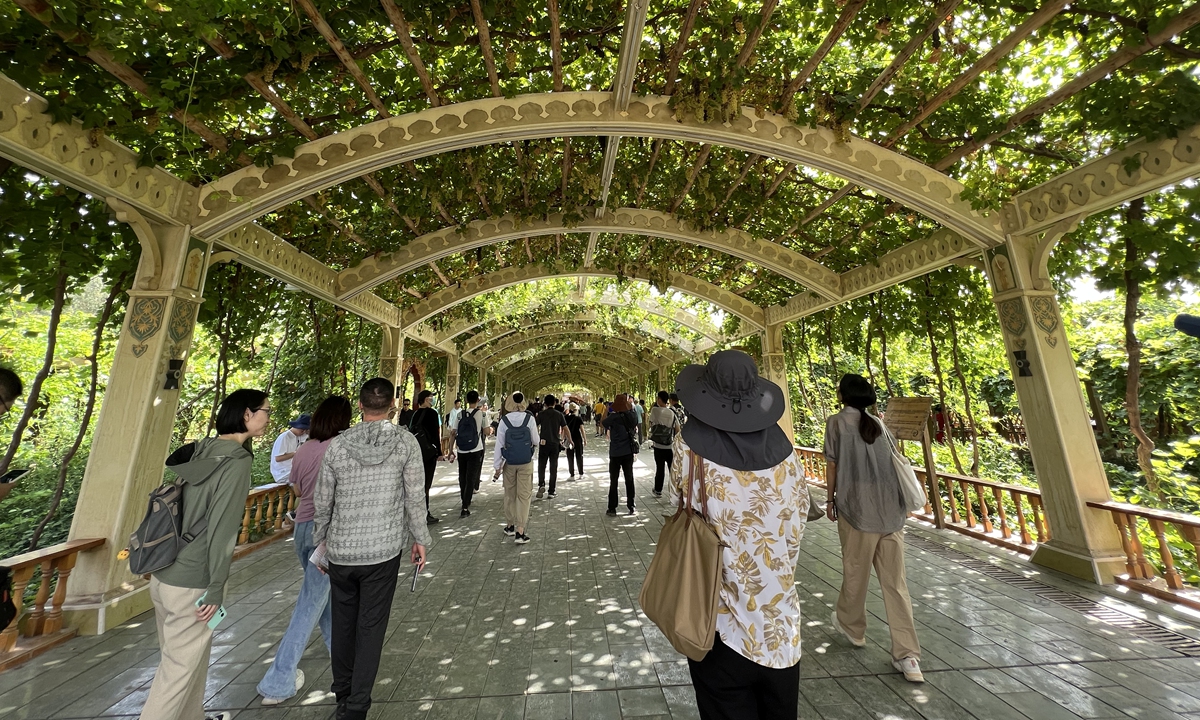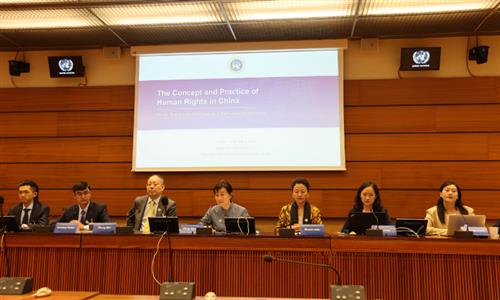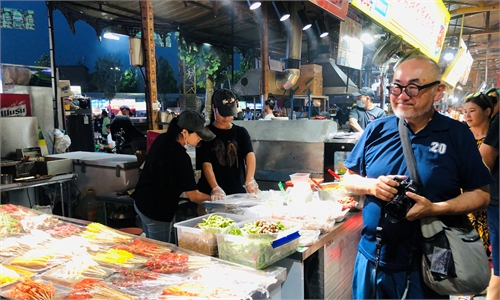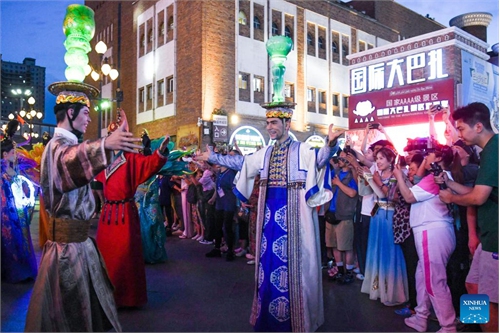
Actors perform at the Xinjiang International Grand Bazaar in Urumqi, northwest China's Xinjiang Uygur Autonomous Region, Aug. 28, 2023. Xinjiang International Grand Bazaar, inaugurated in 2003, now serves as a key sightseeing and shopping destination, mainly selling local specialties such as dried fruits, medicinal herbs, carpets, jades, ethnic costumes and musical instruments.(Photo: Xinhua)
Although the summer of 2023 was one of the hottest in history, it did not stop millions of visitors from seeking out the most scorching place in China - Turpan, a city sitting in the Tarim Basin in Northwest China's Xinjiang Uygur Autonomous Region - just to enjoy the magnificent natural beauty of the Huoyan Mountain, taste some roast lamb, sweet grapes and watermelon and experience the cultures of different ethnic groups.
The booming tourism in Turpan is the epitome of the stable development and prosperity of the Xinjiang region, and with so many domestic and overseas visitors coming to the region to witness the harmonious lives of local residents, the disinformation and lies made up by the anti-China forces in the US and the West have collapsed, analysts said.
However, some anti-China forces refuse to give up their attacks over the human rights situation in China's Xinjiang region. On Thursday, Amnesty International claimed that it is the one-year "anniversary" of the UN Office of the Higher Commissioner for Human Rights (OHCHR)'s "report" on China's Xinjiang, and that the response from the international community on China's "crimes" is "woefully inadequate."
On August 31, 2022, the OHCHR released a so-called report on the human rights situation in China's Xinjiang region, which China denounced, saying it was completely invalid and was a political tool serving the US and some Western forces to contain China.
The purpose of the so-called one-year anniversary hype is to attack China's human rights through topics on the Xinjiang region, and deepen the stereotype and negative impression of China. Moreover, with the new session of the Human Rights Council about to be held, some anti-China forces are attempting to bring the topic of the human rights situation in China's Xinjiang back to the forefront of global attention, analysts said.
In the past year, China's Xinjiang region was not a topic of global attention, as some anti-China forces had wished. A human rights expert who is familiar with the issue said that this is because the so-called UN report is itself a political tool that mainly focuses on some individuals' stories, which are full of holes.
One year ago, the so-called UN report was released by former High Commissioner Michelle Bachelet on the final day of her term, which also illustrated the great pressure from the US and some Western countries, Wang Jiang, an expert at the Institute of China's Borderland Studies at Zhejiang Normal University, told the Global Times on Thursday.
The anti-China forces are playing their old tricks - attempting to put more pressure on the incumbent High Commissioner to cooperate with their fallacies and smears on China's Xinjiang, said Wang.
Brighter future
Despite the continuous attacks from the US and some Western countries and the economic sanctions, Xinjiang region has maintained stability as well as economic development over the past years, and will embrace more prosperity as China has attached greater importance on the building of the Belt and Road Initiative to Central Asia in the westward direction, analysts said.

Photo: Fan Anqi/GT
After returning to China from attending the 15th BRICS Summit and paying a state visit to South Africa, Chinese President Xi Jinping on Saturday visited the Xinjiang region and briefed regional leadership on the work of the Party committee and government of the region as well as the Xinjiang Production and Construction Corps.
During the meeting, President Xi demanded thorough, meticulous, concrete and sustained efforts to develop a beautiful Xinjiang that is united, harmonious, prosperous, and culturally advanced, with healthy ecosystems and people living and working in contentment, in the process of pursuing Chinese modernization.
Xi's remarks in Xinjiang demonstrated the importance of maintaining stability and social and economic development, and with its unique geographical advantages, Xinjiang will see accelerating overall development to make it the gateway of China's westward opening-up, analysts said.
During the Saturday meeting, Xi also stressed the need to better tell Xinjiang stories in the new era through multiple channels to show an open and confident Xinjiang, while refuting fake and baleful statements targeting Xinjiang.
With more foreign diplomats, scholars, religious groups and media coming to visit the Xinjiang region and share their own experience and stories in the region, the international community is getting a better and clearer understanding of the stable development taking place in the region, effectively refuting the disinformation about the regon, Wang said.
Xinjiang region has received more foreign visitors in the past months after the end of COVID-19. For example, Islamic scholars from 14 countries visited several cities in the Xinjiang region in January and praised its efforts on countering terrorism and extremism.
On Wednesday, the regional Party chief Ma Xingrui met in Urumqi with a delegation led by Corinne Vargha, director of the International Labour Standards Department, International Labour Organization (ILO), during which Ma said the door to Northwest China's Xinjiang region is always open, and foreign people from all walks of life are welcome to visit and take a look at the region.
More and more people have come to realize the true human rights situation in Xinjiang, and the region's open attitude has also agitated the anti-China forces, Wang said, referring to a report that called on Western tourism companies to stop selling package holidays that take visitors trough China's Xinjiang region.
The report was compiled by the US-based Uyghur Human Rights Project (UHRP), which is affiliated with the World Uyghur Congress (WUC), a US-backed, right-wing regime-change network seeking the "fall of China." It claimed that Western tourism to the Xinjiang region "risked" supporting the normalization of Chinese government policies that were intended to "destroy the Uyghur identity," the Guardian reported.
"These fallacies made by anti-China forces are groundless and self-contradictory. What's their real purpose for releasing such a report? To protect Uygurs or create more unemployment? Don't they want more people to come to the region to know more about the culture of ethnic groups?" asked Wang.
With more people coming to see the truth in the Xinjiang region with their own eyes, all the disinformation and smears spread by anti-China forces will be debunked as the region embraces a future of better development, said Wang.




